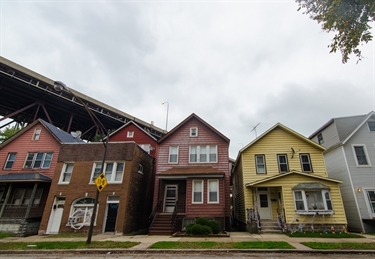Issue
Chicago consistently ranks among America's top segregated regions. Like many U.S. metropolitan regions, historical and ongoing systemic racism has blurred the lines between racial and economic segregation; today, our poorest residents are disproportionately people of color living in communities of concentrated poverty. While the disadvantages of living in concentrated poverty have been well documented, there is less evidence of the disadvantages of segregation to all of a region's residents. MPC and Urban Institute's study rests on the premise that not only low-income people and communities pay the price, but that segregation hampers the economy and quality of life for everyone living in metropolitan Chicago. Therefore, all must be part of the solution.
Solutions

Eric Allix Rogers
In the second phase of the study, we are exploring what can be done to change patterns of racial and economic segregation given its negative impact on issues of equity.
In-depth quantitative and qualitative research is driving this work along with study trips to cities that are proactively working to address equity issues.
Scheduled for release in 2018, we are partnering with a wide range of advisors to identify solutions for creating an integrated, equitable and economically stronger metropolitan Chicago.
Our goal is to develop and model housing, transportation, economic, health, safety and education policy interventions aimed at addressing segregation. We are also examining policies that address our deep inequities and need for dialogue across groups.
These policies will define our future city, county and regional advocacy agenda.
Benefits
The next phase of our work will point to policies that:
-
Improve options for families of all incomes. We believe it is possible to invest strategically in both high- and low-income communities so that fewer people must choose between affordable housing and other factors that contribute to a high quality of life, such as living wage jobs, well performing schools, safe streets and reasonable commutes.
- Grow Chicago's middle class. Over the past five years, 96 percent of Chicago's anemic growth has been non-families, or singles. It's also true that the number of Chicagoans at the high and low ends of the income spectrum have grown while the number of middle-income earners has shrunk. We are examining policies that would foster a thriving middle class in the Chicago region, which is necessary to sustain successful public schools, infrastructure, retailers and the service and entrepreneurial economies.
- Support equitably integrated and successful public schools. There are a range of public schools in the Chicago region that are performing well. Some are racially and economically integrated; others are not. Still others have lost ground on integration over time. What can we learn from them all?
- Maintain and expand Chicago's diverse economy. Places where low- and high-skilled workers live and work near one another fare better because they have the full range of human capital necessary for a diverse economy. As an economic imperative, we are exploring policies that support integrated communities.
- Improve people's safety and well-being. Many factors contribute to high rates of crime, mortality and disease, which disproportionately affect low-income communities but carry huge costs for everyone. We will focus on policies that support community design and development that lead to safer, healthier neighborhoods.
Learn more